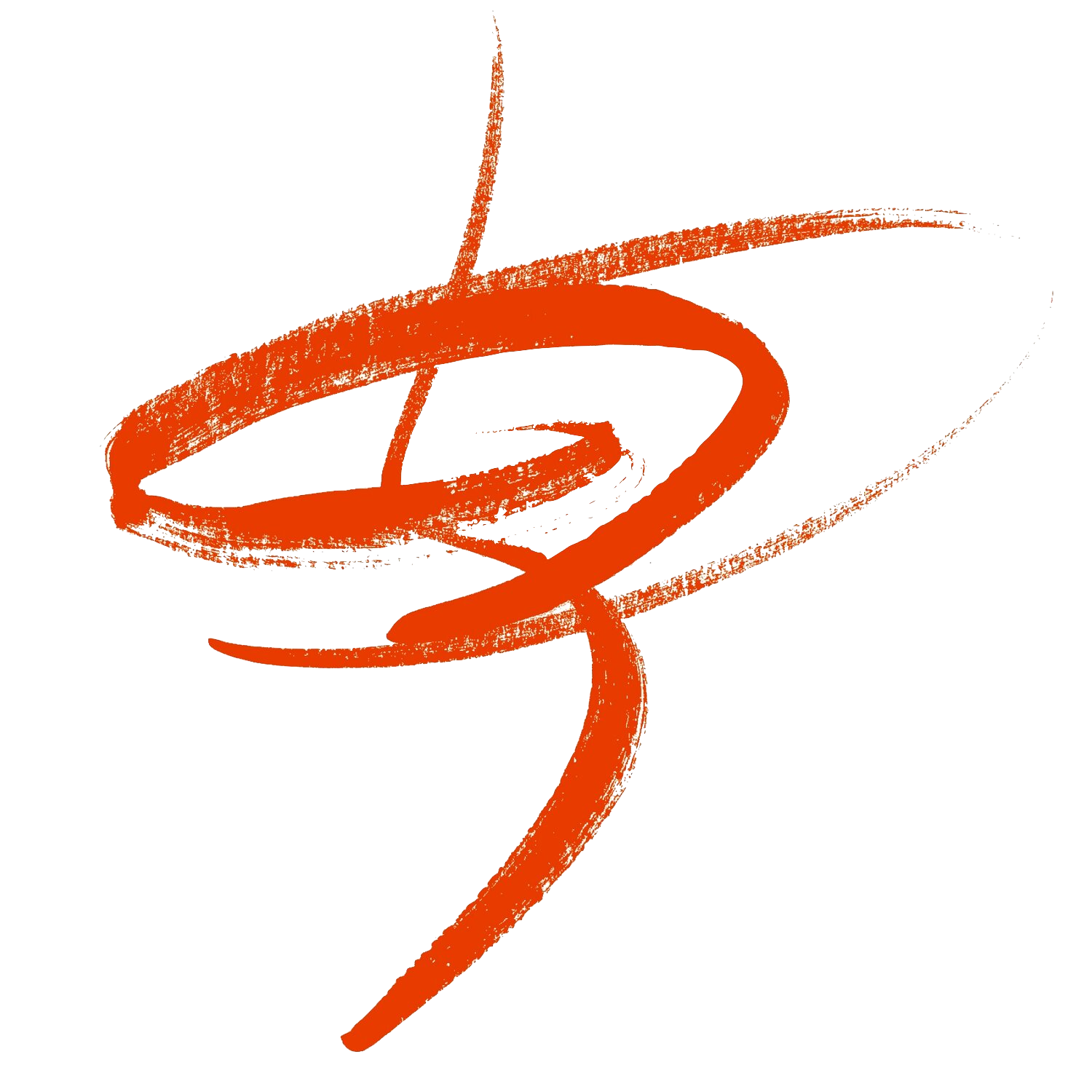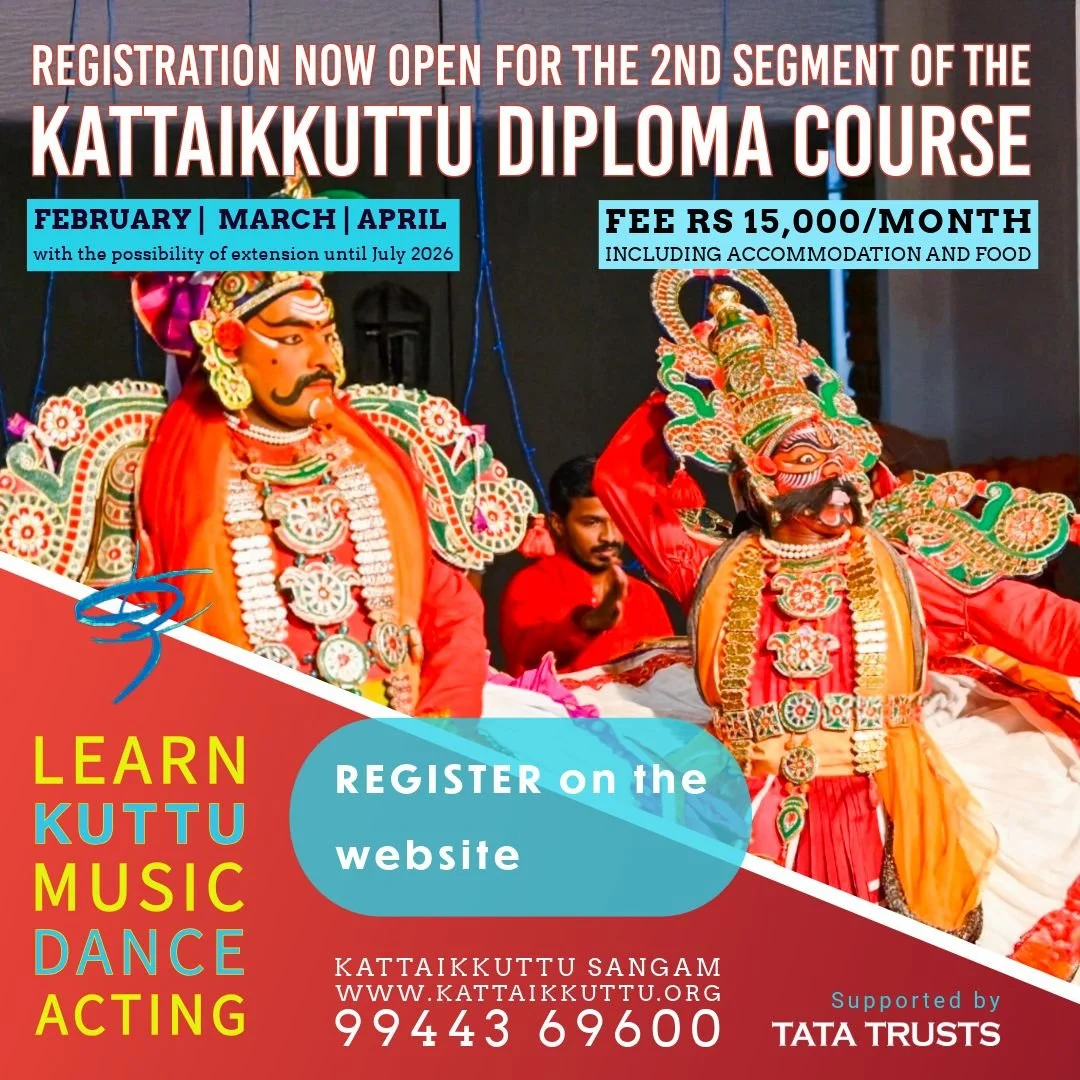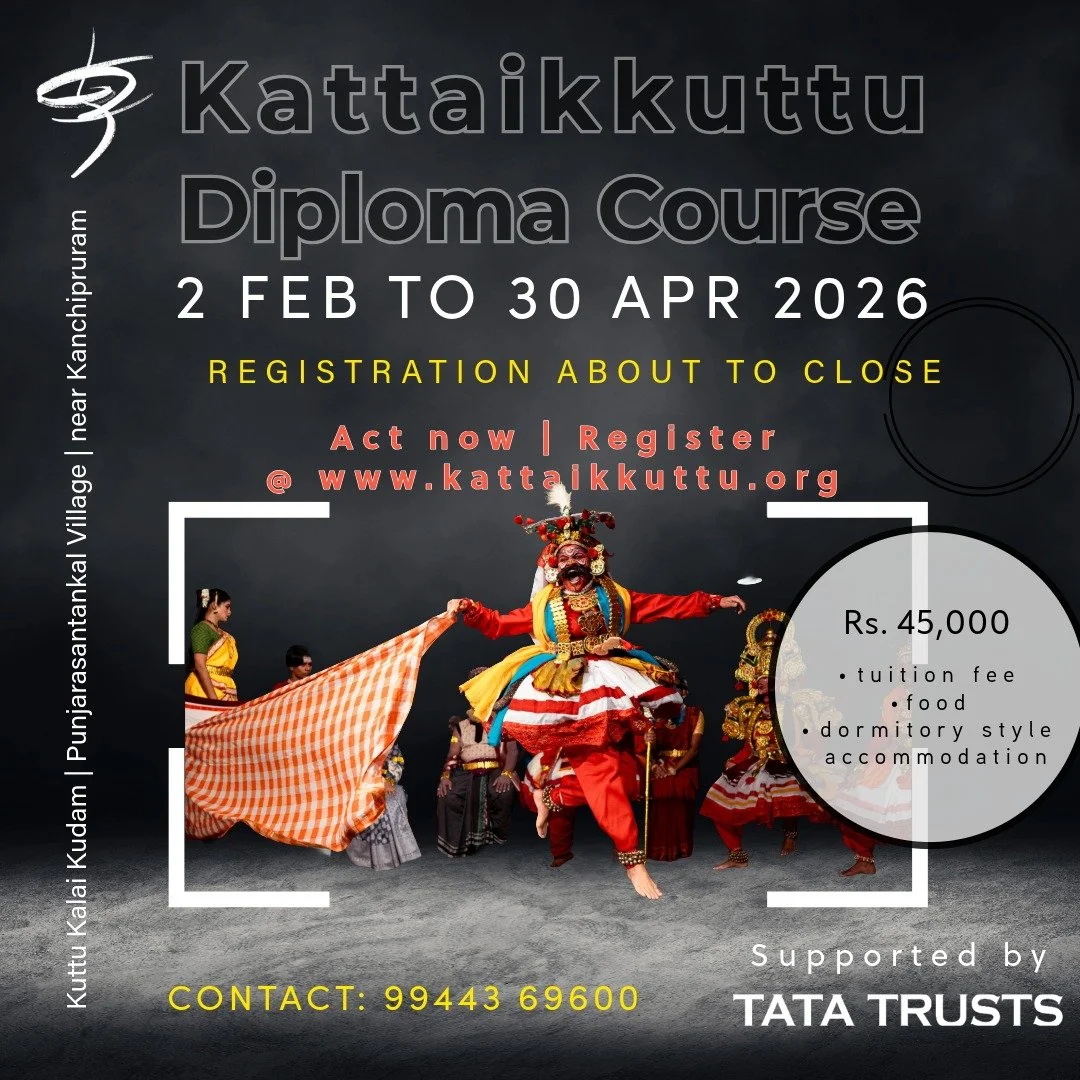Kattaikkuttu Diploma Course
The Sangam offers a first-of-its-kind Diploma Course in Kattaikkuttu. Conceptualized as a 10-month residential program, the course allows participants unable to commit to 10 months, designated segments of 3 months. The Diploma Course provides hands-on training in acting, singing, movement, and Kattaikkuttu’s repertoire under the guidance of Guru P. Rajagopal and experienced teachers. Participants will also learn to play a musical instrument (harmonium, mridangam/dholak, mukavinai). Upon successful completion, graduates will receive a diploma and be well-prepared for roles in Kattaikkuttu theatre or contemporary theatre and film.
With the number of senior expert-Kattaikkuttu actors and musicians dwindling swiftly, Kattaikkuttu’s complex corpus of knowledge and its traditional repertoire are at risk of no longer being transmitted in full. This threaten not only the quality of future performances, but also the continuity and validation of Kattaikkuttu as a theatre that is an intrinsic part of the intangible Tamil heritage and a rich source of the Tamil language. Therefore, we are extremely happy that the Tata Trusts (Mumbai) have agreed to support the Kattaikkuttu Diploma Course from 2025 to 2028.
Registration
Open to individuals over 18, the course has a limited enrolment of 20 to 25 participants. While prior experience in the performing arts is welcome, it is not a requirement. The training takes place at the Kattaikkuttu Sangam in Punjarasantankal, located 8 km outside Kanchipuram. Registration is still open for 1 February to 30 April 2026 segment of the Course. Interested persons can register here.
Watch Diploma Course participants in action here..
Interested in a Kattaikkuttu Workshop?
Please fill out the form below. We will add your name to our mailing list and let you know when future workshops take place.
G Swaminathan, Shraddha-actor on his participation in the 2021 Kattaikkuttu Masterclass by P Rajagopal
“If you are an actor looking to expand your craft, to find something new, expose yourself to the rigours of a heritage art form and train with one of the contemporary greats in the art of Koothu... dearest Rajagopal ayya... here's a chance you MUST NOT miss...
The Kattaikkuttu Sangam is offering weekend workshops on the basics of Koothu (கூத்துக்கலை) this November. I attended an extended version of their workshop in 2021 (in between COVID waves) with Krishnamurthy and it was an experience of a lifetime. My daughters accompanied me in this journey and I can see how it opened them up in ways more than I can detail out here. That will need a separate essay.
If rain is your only excuse - I'd just say - you have to see the pristine environs of Punjararasanthangal and the adjoining Palar river to see why that can't be an excuse but rather all the more reason for you to attend these workshops at this time. These are monsoon workshops and they will leave you enriched just like the monsoons themselves.
So, go ahead, register NOW!”
Testimonies of 2 participants in our Kattaikkuttu workshops
Praveen Vijayakumar, Singapore/Ph.D. candidate University of Pennsylvania, USA, about the Kattaikkuttu weekend-workshops in Nov 2022 on his Facebook page, 30 Dec 2022
“தக்கதோர் அண்டரண்ட (இச்) சராச்சரம் எவையும் தந்து, மிக்கவே அளித்துக்காக்கும் மேண்மை முத்தொழில் நடாத்தி / பக்குவமுடைய ஞான (சிவ) பாதத்தை பெற்றோர்க்கெல்லாம், கைக்கனி போல் விளங்கும் கடவுள் சஞ்சரணம் போற்றி”
The most enriching event of 2022 for me were the weekend workshops conducted by the Kattaikkuttu Sangam in November. The school is headed by P. Rajagopal and Hanne de Bruin. Rajagopal is a hereditary Kattaikkuttu performer and teacher, and his partner Hanne is an anthropologist whose pioneering work continues to supply us with shrewd insights on the lesser studied, albeit incredibly nuanced South Asian art form.
Kattaikkuttu, otherwise referred to as Terukkuttu, is a form of Tamil theatre popular in the northern parts of Tamil Nadu which re-enacts episodes from epics and regularly incorporates musical modes and content that are representative of and responsive to the contemporary socio-cultural milieu. Ss Hanne has described in her work, it is a “flexible” art form. The workshops were conducted with the support of the school’s extremely skilled alumni comprising of Mahalakshmi Rangasamy, Moorthy Palani, Balaji Ramakrishnan, Tamilarasi Shanmugam, Duraisamy Mari and Venda Kumaresan.
We spent 3 intense weekends learning key elements of Kattaikkuttu which allowed us to gain an introductory understanding of the art form. Every session began with us warming up our bodies for what was always a physically demanding-rewarding class (we made up for the weekend we had to cancel due to heavy rains the following week). Rajagopal sir would demonstrate every element we were scheduled to learn that weekend and he would dedicatedly follow each student’s progress and ensure that each one of us were able to fully apply ourselves and understand the movements, dialogues and songs.
I am a somewhat inhibited student in the classroom which Rajagopal sir quickly understood when he asked me to sing and found me self-consciously staying at the lower octave. He didn’t pressure me further that day but he quickly taught me to apply my voice with the accompaniment of the harmonium the following weekend.
Much can be said about the setting of the school which is located past a mostly dried but busy-on-weekends river in the “greatest city” Kanchipuram, far away from congested roads and Swiggy or Zomato’s food delivery radius. But what I cherished most was the quiet. The quiet allowed me to rehearse our lessons in my head and sometimes in front of the mirror in my room at KKS where I stayed every weekend. It allowed me to replay my conversations with several of our teachers, Rajagopal sir and Hanne included, as well as fellow students all of whom patiently answered my questions and listened to my thoughts during coffee/tea and biscuit breaks. It also allowed me to replay my visits to the libraries that week in Chennai and mentally catalogue the materials I was able to browse through. Most rewardingly of all, the weekends gave me the mental space to think more carefully but also “physically” about the history of South Indian performing communities and arts.
Training
transmitting embodied knowledge
in theater, epos & ritual
Kattaikkuttu is an experiential, sensorial and cognitive form of “doing” and “knowing”. The theater represents a unique body of pragmatic artistic knowledge. This knowledge is tacit; it cannot be found in textbooks and is deeply and intricately interwoven with the cultural context in which Kattaikkuttu is embedded.
We organize artistic workshops and courses in Kattaikkuttu acting, movement, singing, instrumental music, make-up and the interpretation of complex Mahabharata epic texts that aim to transmit this knowledge undividedly and in its entirety.
P. Rajagopal is an exponent of the Perungattur style of Kattaikkuttu, in addition to being the artistic leader of the Sangam. As a seasoned actor from a family of traditional performers, Rajagopal is one of the repositories of Kattaikkuttu’s multi-facetted, sensorial knowledge—
knowledge that is created in and transmitted through performance;
knowledge that may be intimately linked to ritual practices, which are integral to all-night performances; and
knowledge that can be learned only through personal experience and an immersive practice.
The modalities of a workshop and its duration will be tailor-made to cater to your specific needs. To make a workshop or course viable we need a minimum of 15 participants.
Acting
becoming the character
We offer you the opportunity to explore Kattaikkuttu’s different knowledge worlds. Familiarize yourself with the basics of Kattaikkuttu singing, acting, movement or music. What does it mean to become the character and how do you accomplish that? How does Kattaikkuttu interpret the complex Mahabharata epic? How contemporary are its plays?
Our artistic workshops allow you to familiarize yourself with the basics of Kattaikkuttu theater or music making and/or acquire specific performances skills that you can apply to your own theater or profession. You will experience Kattaikkuttu’s energy and power generated by the theater’s unique sound scape, movement, narratives and acting techniques.
The high-pitched, oboe-like mukavinai is pivotal to the Kattaikkuttu’s sound scape. Mastering it is difficult and teachers have become rare. The Sangam is one of the very few places where (aspiring) musicians can learn to play the mukavinai.
Such immersive experiences can be extended by visiting rural temples that, for local people, often are sources of energy and healing.
View a Kattaikkuttu workshop for students from the Conservatoire National Supérieur d’Art Dramatique (CNSAD) in Paris, France through a 2-day onsite workshop.
Craft
make-up & ornaments
The characters in Kattaikkuttu’s epic and puranic repertoire wear a mask-like make-up that can be very complex. Knowledgeable spectators identify a dramatic person on the basis of his or her make-up. The color of the make-up tells us something about the temperament of a character: Duhsasana’s red indicates his anger and aggression, Arjuna’s green-yellow shade stands for his heroism and pink is for more composed or even placid characters, such as Yudhisthira.
The make-up consists of a basic color the shade of which varies depending on the moment in the narrative, in addition to intricate decorations made on top of this basic color. We use coconut oil, water and talcum powder to fix the make-up, which needs to stay on for 8 hours even when the performers are sweating. Most of the colors nowadays or chemical; a few are made from natural ingredients.
Making the theater’s characteristic wooden kattai ornaments inlaid with mirror work is an art in itself. A crafts person can teach you how to do this.
Academic
lecture/demonstration
Combining their academic training and in-depth performance knowledge, Dr. Hanne M. de Bruin and P. Rajagopal jointly introduce participants to specific aspects of Kattaikkuttu, the theater’s history and social status, production and transmission of knowledge and interpretation of texts. In addition to wide-ranging discussions about theater and performance and the opportunity to experience Kattaikkuttu live within its own environment, such programs can include a workshop component where participants can bring aspects of what they have learned into practice. So far these tailor-made academic programs and workshops have been extremely exciting events of great diversity:
3-day workshop offering international Expressive Arts Therapists led by USA-based psychologist, expressive arts therapist and international educator, Dr. Kate Donohue, a glimpse into the soul of Kattaikkuttu (2015).
Workshops for students of the South Asia Center of Pennsylvania University (USA) under the guidance of Professor Davesh Soneji looking into the recent history of Kattaikkuttu and its connections to the rural Devadasi tradition (2017 & 2019).
8-day exposure visit for students of Flame University in Pune led by Prof. Kedar Kulkarni and Prof. Lily Kelting during which they acquired hands-on experience about all aspects of the Kattaikkuttu Gurukulam (2018).
Kattaikkuttu course for students of the performing arts department of Ashoka University in Haryana, followed by an onsite workshop at the Sangam (2019 & repeated again in 2020).
Corporates
addressing problems on the workfloor
Kattaikkuttu is an experiential medium through which you can explore and enhance your emotional skills and apply them to day-to-day work and life situations. Our corporate workshops help you to better understand your own role and the role of others in a team. We often use characters from Kattaikkuttu’s Mahabharata repertoire to allow you to imagine complex situations in which you may be torn between different loyalties, your own desire and empathy for the other.
We challenge you to discard the barriers that prevent you from solving problems on the work floor. We help you discover whether your desired role and what you do in actual practice are in harmony. We encourage gender sensitivity and provide you with skills to understand and solve interpersonal problems and dilemmas in respectful and non-violent ways.
“Overall content as well as quality was superb. Via scenes from the Mahabharata we related ourselves with the real life scenarios that we face in everyday life.”
— Sheetal Doshi, Shell International Chennai















